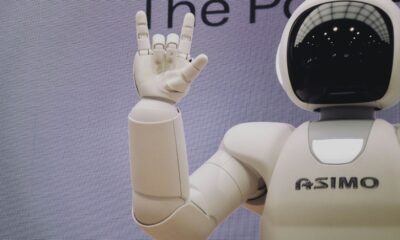EDUCATION
Navigating The Ai Frontier In Higher Education Shi: Overview

The world of education is undergoing a seismic shift, with artificial intelligence (AI) at the forefront. As institutions embrace technology, they are not just enhancing traditional methods; they are redefining what it means to learn and teach. The landscape of higher education is evolving rapidly, creating both excitement and apprehension among students and educators alike.
Navigating the AI frontier in higher education presents opportunities that were once thought to be merely futuristic dreams. From personalized learning experiences to streamlined administrative processes, AI has the potential to revolutionize how knowledge is shared and absorbed. But with great power comes significant responsibility—questions arise about ethics, data privacy, and accessibility.
As universities explore this brave new world filled with algorithms and machine learning models, understanding the benefits alongside the challenges becomes essential for all stakeholders involved. Join us as we delve into this transformative journey through higher education’s digital renaissance guided by artificial intelligence!
Benefits of Implementing AI in Higher Education
AI in higher education brings a multitude of benefits that can transform the learning experience. One significant advantage is personalized learning. AI-driven platforms analyze student performance, tailoring content to meet individual needs and pace.
Another key benefit is enhanced administrative efficiency. By automating routine tasks like scheduling and grading, institutions can free up valuable resources for more strategic initiatives.
AI also plays a pivotal role in data analytics. Universities can harness insights from vast amounts of data to improve curriculum design and student retention rates.
Moreover, it fosters better engagement through intelligent tutoring systems that provide immediate feedback. This support helps students grasp complex concepts with ease.
Accessibility improves as AI tools break down barriers for diverse learners. With features like speech-to-text or language translation, all students have the potential to thrive academically regardless of their background.
Challenges and Concerns Surrounding AI in Higher Education
The integration of AI in higher education brings forth several challenges and concerns that cannot be overlooked. One significant issue is data privacy. With vast amounts of student information being collected, institutions must ensure that this data is protected from breaches.
Another concern revolves around the potential for bias in AI algorithms. If not properly managed, these systems may inadvertently reinforce existing inequalities within educational contexts, affecting marginalized groups disproportionately.
Additionally, there’s a fear of job displacement among educators. As automation increases, some worry that roles traditionally held by humans might be diminished or replaced altogether.
The lack of understanding about how to effectively implement and utilize AI tools poses a barrier to their successful integration. Institutions need comprehensive training programs to help faculty and staff adapt to these evolving technologies seamlessly.
Successful Case Studies of AI Integration in Higher Education
One notable example of AI integration is Georgia State University. They implemented an AI-driven chatbot named Pounce, which assists students with inquiries about registration and financial aid. The result? A significant reduction in the dropout rate.
Another success story comes from Purdue University with their use of predictive analytics. By analyzing student data, they identified at-risk students early on and provided targeted support. This initiative led to improved graduation rates.
The University of Southern California adopted adaptive learning technologies in its online courses. These tools personalize the educational experience for each student, catering to individual learning speeds and styles.
These case studies demonstrate that when institutions embrace innovative AI solutions, they not only enhance engagement but also foster academic success among diverse student populations.
The Future of AI in Higher Education
The future of AI in higher education promises to reshape the learning landscape dramatically. Imagine personalized learning experiences tailored to each student’s needs and pace. This technology could analyze performance data to provide targeted resources, making education more efficient.
Moreover, administrative processes will evolve too. Automation can streamline enrollment, grading, and communication between students and faculty. This frees up valuable time for educators to focus on teaching rather than tedious paperwork.
AI could also enhance academic research by identifying trends and generating insights from vast amounts of data. Collaborative tools powered by AI may lead to groundbreaking discoveries across disciplines.
As institutions embrace these innovations, ethical considerations surrounding data privacy and equitable access must be addressed. Open dialogues about these issues will ensure that technology benefits all stakeholders involved in the educational process moving forward.
How to Prepare for the Changing Landscape of Higher Education with AI
Adapting to AI in higher education requires proactive steps. Start by embracing a mindset of continuous learning. Faculty and staff should explore online courses or workshops focused on AI technologies.
Next, institutions must invest in infrastructure. This includes robust data management systems that can handle AI tools efficiently. Ensuring cybersecurity measures are in place is equally essential.
Collaboration is crucial as well. Engage with tech companies and educational innovators to stay updated on the latest advancements. Form partnerships that enhance curriculum development through AI integration.
Encouraging student involvement can also help smooth the transition. Allow students to provide feedback on new technologies being implemented, ensuring they feel included in their educational experience.
Fostering an environment of experimentation will aid adaptation. Encourage faculty to pilot small-scale projects using AI before fully integrating them into programs.
Conclusion: Embracing AI for a More Efficient and Effective Educational Experience
The integration of AI in higher education presents an exciting opportunity for institutions, educators, and students alike. As we navigate the AI frontier in higher education at Shi, it’s clear that embracing these technologies can lead to a more efficient and effective educational experience.
By harnessing AI’s potential, universities can personalize learning paths and streamline administrative processes. This not only enhances student engagement but also optimizes resource allocation within institutions.
However, it is essential to approach this transformation thoughtfully. Addressing challenges such as data privacy concerns and ensuring equity will be crucial for successful implementation. Institutions must prioritize transparency while fostering an environment where both faculty and students feel empowered by technology.
Looking ahead, the future holds immense possibilities. By preparing adequately today—through training educators on new tools or investing in infrastructure—higher education can evolve into a landscape that truly supports all learners.
Embracing AI will require commitment from all stakeholders involved; yet those who do stand to benefit immensely from improved educational outcomes. The path forward may be complex, but with thoughtful navigation of this technological revolution, we are poised for a brighter academic future filled with endless possibilities.

EDUCATION
Lillienu and the Quiet Revolution of the Mind

Lillienu is a word not found in dictionaries, yet its emotional resonance is powerful. It’s more than a name or a term. It’s an experience, a sensation that touches on identity, subtle emotions, and internal transformations. Lillienu speaks to those hidden moments we often ignore, those micro-emotions between joy and sadness, between clarity and confusion.
The Mysterious Origins of Lillienu
The word lillienu does not have a defined etymological trail. It’s as if it emerged out of a collective unconscious, a shared need to name something unnameable. Some speculate it may be derived from a poetic language, possibly inspired by nature or abstract emotional states. The vagueness adds to its charm. Like an unmarked path in a forest, lillienu invites you to explore without needing a map.
Lillienu as a Feeling, Not Just a Word
Trying to explain lillienu is like trying to explain a scent or the way a specific song makes you feel. It’s an emotional whisper, not a scream. It shows up during stillness, when you’re lying in bed and your mind drifts between memories and imagination. It’s when you miss something you can’t name, or when your heart feels heavy, but you smile anyway. Lillienu is the beauty in emotional contradiction.
Emotional Nuances of Lillienu
The emotional palette of lillienu is subtle yet layered. It’s not overwhelming like grief, nor is it bright like elation. It hovers, like mist on a quiet morning. You might feel lillienu when looking at an old photo, or when someone you love speaks with a tone that hits deeper than words. It’s a response that isn’t fully conscious, yet deeply real.
Lillienu in Daily Life
People often experience lillienu without knowing it. It appears in those fleeting seconds when the world pauses and you’re left alone with your thoughts. It could be watching your child sleep, hearing a line in a film that unexpectedly tugs at your heart, or catching a scent that reminds you of someone you once knew. Lillienu is the thread connecting moments that don’t seem important, yet shape who we are.
Is Lillienu a Universal Experience?
Despite its obscurity, lillienu is arguably universal. Though people may call it different things or not name it at all, almost everyone has felt its presence. It transcends language, culture, and background. The world is too fast, and moments of lillienu slow it down just enough for us to breathe, remember, and feel.
The Role of Lillienu in Personal Growth
Lillienu may seem passive, but it’s deeply transformative. These moments of quiet emotion become the soil in which introspection grows. When you allow yourself to feel lillienu instead of brushing it aside, you often discover truths about yourself. It’s a mirror that doesn’t reflect your appearance but your emotional core.
Lillienu and Creativity
Creatives thrive on lillienu. Writers often sit with it before penning their most poignant pieces. Musicians chase it in melodies. Painters blend it into their colors. It’s the emotion that gives depth and humanity to creative work. Because lillienu taps into something so innately human, it bridges the artist and audience in a deeply intimate way.
The Psychological Significance of Lillienu
While lillienu isn’t a clinical term, psychology acknowledges the impact of unnamed emotions. Emotional granularity—the ability to distinguish between subtle feelings—is linked to better mental health. Lillienu contributes to this awareness. Understanding and accepting such emotions can reduce anxiety and improve emotional regulation. It helps people make sense of internal shifts that might otherwise feel confusing or overwhelming.
Lillienu and Relationships
Relationships often grow deeper in the presence of lillien’u. When people share these soft, unspoken emotions, a new layer of connection forms. It’s the silence after a meaningful conversation. It’s the look between two people that says more than words ever could. Lillien’u creates space for vulnerability, and vulnerability builds trust.
When Lillienu Turns Dark
Though generally gentle, lillien’u can veer into melancholy. When not acknowledged, it may quietly pull someone into loneliness. It can feed the sense that no one else understands. If you experience lillien’u too often without space to express it, it might compound into emotional isolation. That’s why understanding and naming it is crucial. Even a quiet feeling deserves a voice.
Spiritual and Philosophical Interpretations
Some spiritual thinkers interpret lillien’u as the soul’s quiet longing. It represents the human condition’s blend of joy and ache. Philosophers might call it a reminder of our finite nature—how even the most beautiful things are tinged with loss because they’re temporary. Lillien’u asks us to reflect, to feel, and to appreciate every passing second with presence.
The Presence of Lillienu in Nature
Nature is a powerful trigger for lillien’u. A sunset over a calm lake. The stillness of a forest just before rain. The way fog drapes over hills like a protective veil. These natural moments stir something within that words often fail to capture. Lillien’u rises in response to this beauty, to remind us we’re part of something bigger, something profoundly alive.
Can Lillienu Be Cultivated?
Yes, but it requires a shift in how we move through the world. Lillien’u thrives in slowness. Practicing mindfulness, turning off digital distractions, and giving yourself permission to feel are all ways to welcome it. You can’t force lillien’u, but you can make space for it. It appears when we stop trying to control every moment and simply allow them to unfold.
Lillienu and Memory
Memory and lillien’u are deeply intertwined. Often, the emotion arrives wrapped in nostalgia. A song from your childhood. The texture of your grandmother’s couch. The scent of an old book. These triggers don’t just bring memories—they resurrect feelings you didn’t know were still there. Lillien’u brings past and present together in a soft, emotional embrace.
The Future of Lillienu as a Concept
As emotional awareness becomes more important in education, therapy, and conversation, terms like lillien’u will gain traction. The world is moving toward recognizing emotional complexity, and concepts like lillien’u provide language for it. When people can articulate their inner worlds more clearly, communication and empathy improve across the board.
Lillienu in Art and Culture
Even if the word isn’t widely known, its spirit is everywhere in art and culture. Films with poignant, silent moments. Paintings that seem to breathe emotion. Novels that leave you quietly changed. All these are steeped in lillien’u. As society grows more emotionally literate, artists will likely explore this space even more deliberately.
Why We Need Lillienu
In a world focused on productivity, efficiency, and clarity, we need lillien’u. It reminds us that not everything valuable can be measured or optimized. Lillien’u teaches us to honor silence, to sit with the uncomfortable, and to trust the wisdom in subtle emotions. It’s an invitation to pause in a culture that’s always pushing forward.
Living with Lillienu Daily
Incorporating lillien’u into daily life doesn’t mean becoming overly emotional or introspective. It means tuning in. Listen to yourself when your heart feels heavier than your mind can explain. Notice how the wind feels against your skin when the world is quiet. Observe what your soul whispers in those moments. That’s where lillien’u lives.
Conclusion
Lillienu is a quiet revolution. It’s not a trend or a diagnosis. It’s a deeply human experience we all encounter in different forms. Recognizing it adds depth to our lives, our relationships, and our understanding of ourselves. Instead of running from emotional ambiguity, we can learn to sit with it. And in doing so, we might just discover that the softest emotions are the ones that carry the greatest truths.
EDUCATION
What Are the Essential Skills Needed for an Automotive Technician Major

Working in the automotive industry requires a combination of technical knowledge, problem-solving abilities, and attention to detail. Those pursuing a career in this field must develop key skills to handle mechanical tasks efficiently. Understanding vehicle systems, diagnosing concerns, and using modern tools are all necessary abilities. Learning these skills prepares individuals for a rewarding and hands-on career. This article explores the essential abilities needed for success in this industry.
Understanding Vehicle Systems and Mechanics
One of the most important skills in an automotive major is having a strong understanding of vehicle systems. This includes knowledge of engines, transmissions, brakes, electrical components, and other essential parts. Learning how these systems work together helps diagnose and repair mechanical concerns.
Being able to analyze and fix issues requires both theoretical knowledge and hands-on experience. Reading technical manuals and using diagnostic tools play a significant role in this field. A deep understanding of different vehicle models and their unique systems is also essential. Keeping up with new technology ensures that individuals stay prepared for advancements in the industry.
Problem-Solving and Critical Thinking Abilities
Working on vehicles often involves troubleshooting mechanical concerns and finding the best way to fix them. Strong problem-solving skills help identify the cause of performance issues and determine the right course of action. Thinking critically allows individuals to evaluate different repair methods and choose the most effective solution.
Many vehicle concerns require creative thinking and the ability to work under pressure. Finding quick and efficient fixes while maintaining accuracy is important in this field. Critical thinking plays a major role in achieving the best results, whether working with electrical systems, engine performance, or fuel efficiency.
Hands-On Dexterity and Precision
Success in this industry depends on having good hand-eye coordination and the ability to work with precision. Handling tools, assembling components, and making adjustments require steady hands and close attention to detail. Small errors can lead to bigger concerns, so accuracy is crucial when working on mechanical systems.
Performing repairs involves using various tools, from wrenches and screwdrivers to advanced diagnostic equipment. Knowing how to operate these tools safely and effectively improves overall efficiency. Developing strong motor skills and becoming comfortable with different equipment ensures smooth and accurate work.
Communication and Customer Interaction
While technical abilities are important, strong communication skills are equally necessary. Explaining mechanical concerns and necessary repairs clearly helps in building trust with customers. Whether working with colleagues or speaking with vehicle owners, providing clear explanations makes a big difference.
Good communication also involves active listening. Understanding a customer’s concerns and asking the right questions can help diagnose mechanical issues more efficiently. Proper documentation of repair processes and test results ensures that all information is recorded accurately. Strong communication abilities contribute to overall success in this field.
Gaining Hands-On Experience Through Practical Training
Success in the automotive industry requires more than just theoretical knowledge—hands-on experience is essential. Practical training allows individuals to apply what they have learned in real-world settings, helping them develop the confidence and technical ability needed for a successful career. Working with actual vehicles, using diagnostic tools, and troubleshooting mechanical concerns under supervision provide valuable experience that cannot be gained in a classroom alone.
Training programs that emphasize real-world application prepare students for the industry’s demands. Access to professional-grade equipment, experienced instructors, and modern facilities help students refine their skills in a structured environment. Hands-on experience ensures that individuals are ready to enter the workforce with the knowledge and ability to handle modern vehicle maintenance and repair challenges.
Pursuing an automotive major requires mastering essential skills such as understanding vehicle systems, problem-solving, and hands-on precision. Developing strong communication abilities and staying updated with industry trends further enhances success in this field. A well-rounded skill set prepares individuals for the challenges of working on modern vehicles. Gaining practical experience and learning ensures long-term growth in this evolving industry.
EDUCATION
Key College Resources Every Student Needs for Academic Success

Navigating college life requires access to the right tools. Many learners miss out on key support systems that can improve performance and reduce stress. From academic guidance to financial aid, various services exist to help students excel. Understanding these options can make a significant difference in managing coursework, staying organized, and preparing for the future.
Guidance & Support Hub
Academic advisors help current students with course selection, degree planning, and career direction. Many struggle due to a lack of clear academic pathways. Meeting with an advisor ensures a structured plan that aligns with graduation requirements. Counseling services are also available, providing support for stress, time management, and personal challenges. Utilizing these services prevents setbacks and keeps them on track.
Tutoring & Study Boost
- Struggling with coursework can slow progress, but tutoring services provide extra assistance.
- Whether in-person or online, these sessions reinforce difficult concepts and improve comprehension.
- Many institutions also offer study workshops, writing centers, and subject-specific support.
- These programs strengthen academic skills and build confidence in challenging subjects.
- Some colleges even provide peer-led study groups where students collaborate to master material more effectively.
Essential Student Aid
Many students face difficulties outside the classroom that impact performance. Food pantries, emergency grants, and housing assistance programs provide relief for those in need. Struggling with basic necessities can make studying nearly impossible. Many institutions offer programs to support those facing financial hardship, ensuring they can focus on their education. Some schools also partner with local organizations to provide discounts on groceries, transportation, and childcare for those in need.
Tech Help & Tools
Access to the right technology can enhance learning. Many colleges provide free software, online libraries, and IT support for technical issues. Having reliable Wi-Fi, cloud storage, and secure login credentials prevents disruptions. Virtual classrooms, and digital textbooks also improve accessibility and efficiency. Some institutions also loan laptops, tablets, or other devices to students who lack personal access to technology.
Money Matters
Financial aid offices help with tuition, grants, and scholarship opportunities. Understanding deadlines and application processes prevents missed funding. Many students qualify for assistance but fail to apply due to a lack of awareness.
Work-study programs and part-time job opportunities also provide financial relief while offering valuable experience. Many campuses also host financial literacy workshops to help them manage budgets, avoid debt, and plan for future expenses.
Campus Life & Connections
- Student organizations, clubs, and networking events create opportunities for personal and professional growth.
- Engaging with peers and faculty outside the classroom fosters a stronger connection to the college experience and enhances overall well-being.
- Getting involved in campus activities can also help a student build relationships and develop leadership skills.
Health & Wellness
Most institutions offer medical services, counseling, and wellness programs to support students. Stress, sleep deprivation, and poor nutrition can negatively affect performance. Taking advantage of campus resources ensures they stay healthy, focused, and ready to succeed. Many schools also provide access to fitness centers, meditation rooms, and wellness workshops that encourage a balanced lifestyle.
Career & Future Prep
Career centers provide interview coaching, networking opportunities, and job search strategies. Gaining practical experience through internships or part-time work increases employability after graduation. Planning early for career goals ensures a smoother transition into the professional world. Some institutions also host career fairs, connecting students directly with potential employers in their fields.
The use of available support systems by current students makes academic challenges easier to manage. Guidance, tutoring, financial aid, technology, and wellness services all contribute to success. Many overlook these opportunities, but those who take advantage of them gain a significant edge.
-

 FASHION1 year ago
FASHION1 year agoHow to Style Corset Prom Dresses with Accessories from Your Favorite Millinery Shop
-

 TOPIC1 year ago
TOPIC1 year agoInvitation Printing: How to Create Perfect Invitations for Any Occasion
-

 TECHNOLOGY1 year ago
TECHNOLOGY1 year agoAbout Technology From Axiumtechnet: Exploring the Beautiful Future
-

 BUSINESS1 year ago
BUSINESS1 year agoGoogle Business Profile Kgmid Extractor: A Deep Dive
-

 TECHNOLOGY1 year ago
TECHNOLOGY1 year agoAlpha Technologies Fxm350 Snmp Oid: Comprehensive Overview
-

 TECHNOLOGY1 year ago
TECHNOLOGY1 year agoThe Rise of Hqpotner: Exploring Its Impact on the Blogging Community
-

 FASHION1 year ago
FASHION1 year agoUnderstanding Influencersginewuld: The New Wave of Digital Marketing
-

 BUSINESS1 year ago
BUSINESS1 year agoDining Delights: 200 E Business Hwy 23 Walsco Tx